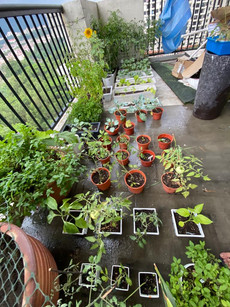Green is the new black in Kuala la la Lumpur
- AnnaKate
- Sep 24, 2020
- 2 min read
AnnaKate has black fingers, instead of green fingers, as whatever she touches dies; and yet still hopes her mini green space would feed her expensive organics in the city.
Photos credit to the owner
With cost of living rising on the back of a mellow economy, urban gardening has been the talk of city dwellers in the past few years. The public was aware of this green movement but only with small scale agriculture, including the practice of composting using organic wastes.
This year, COVID-19 became the catalytic fertiliser in the dramatic growth of urban gardening. As the economy shuts down, prices of fresh foods soar amid low supply.
Long queues into markets to comply with social distancing deterred consumers going to public areas. Meanwhile, being homebound for months has more home chefs sprouting.
More urbanites began picking up their spades to grow organics be it in their own yards or back alleys. Particularly popular were immune-boosting foods, as people become even more conscious what they consume during this health crisis.
Urban gardening, however, is not a fresh phenomenon in Sentul. In the humble part of Kuala Lumpur before the cataclysmic days of COVID-19, there has been a budding social enterprise called “grow X dignity”. A Transformational Enterprise by Dignity for Children Foundation, it focuses on turning unused urban locations like rooftops and empty plots of lands into fruitful green spaces.
grow X dignity currently has four rooftop gardens planted above their classroom buildings while utilising an empty DBKL’s land (with approval) near Dignity’s own café, eat X dignity.
Set to be an example of a healthy lifestyle to the community, the urban gardens are primarily used by Dignity’s students as part of an up-skilling initiative under the NGO’s unique education mode.

Photo credits to Dignity for Children Foundation
The students work in teams to plant, germinate, tend to, and harvest various crops including leafy vegetables, local herbs and fruits, as well as ulam.
The concept of farm-to-table is realised when the fresh produce go directly to the school’s kitchens to prepare meals for the younger students, while some are sold or used in eat X.
Gardening essentially teaches a deep appreciation of the environment and growing food. In Dignity, the youths learn about composting, natural herbicides and pest-control methods. This means that the produce grown and consumed is fresh and chemical-free whilst organic wastes are re-purposed.

Photo credits to Dignity for Children Foundation
Urban gardening can inspire and bring communities together to take ownership of their local environment and be custodians of the future. This increases general emotional and social well-being while reducing stress levels of city dwellers. People find solace in having edible plants at home. What’s more, they literally reap what they sow, in a good way.
In a bigger picture, urban gardening, or farming, could reduce urban poverty and potentially play an important role in enhancing urban food security. It is also a critical component of the United Nation’s Sustainable Development Goals — making urban areas more self-sufficient and mitigates harming the earth caused by conventional agriculture.
Finally, urban farming promotes social inclusion of the urban poor, as well as greening of the city with smart re-utilisation of urban wastes.
So gear up in your garden gloves and start growing your own food!



















Comments